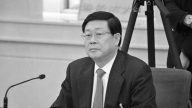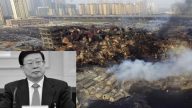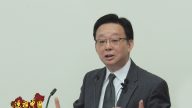【新唐人2011年10月8日訊】100年前,中國大陸一場推翻滿清暴政的「武昌起義」活動,成就了辛亥革命的變革。被海峽兩岸尊為國父的孫中山先生,當年留下遺言“革命尚未成功,同志仍需努力”,那麼,當年中國革命先烈們的民主革命,在百年後的今天完成了嗎﹖
台灣正在慶祝「中華民國建國百年」,而中國大陸當局在慶祝辛亥革命百年時,不僅只字不提中華民國,還比以往低調。“革命”在中國竟成了敏感詞。
「中國民主運動海外聯席會議」等十幾個團體,在美國國會大廈也舉辦了研討會,多位中國問題專家回顧中國一百年來的歷史,並探討中華民族面臨的抉擇和未來的出路。
「中國民主運動海外聯席會議」主席魏京生表示,今年中共比較緊張,因為現在大部分老百姓認為改革已經沒有希望了,只剩下革命了,所以共產黨很怕辛亥革命的『革命』這兩字。
中國民主運動海外聯席會議主席魏京生:「過去每年不管我們在大陸還是在台灣,紀念辛亥革命好像是一個常規性的活動,兩邊都搞的熱熱鬧鬧的、轟轟烈烈的。回憶那段歷史,講到偉大意義——孫中山先生領導著一批革命志士,一而再再而三的起義,流血犧牲也不怕,最後終於創建了亞洲第一個民主共和國。」
魏京生認為,歷史再一次走向了轉折點。一百年前滋生辛亥革命的土壤,同樣存在今天的中國,民眾的革命意識一旦被喚醒,中國就可能發生巨變。
而美國喬治梅森大學客座教授章天亮,也在這場辛亥革命研討活動中表示,中共當然不太敢紀念辛亥革命,因為中共的貪污比滿清政府有過之而無不及。如果紀念辛亥革命,其實是在喚醒民眾的革命意識。
美國喬治梅森大學客座教授章天亮:「不光是中東和北非都發生了茉莉花的革命。就包括在80年代末90年代初的時候,蘇聯解體跟東歐巨變,都有一個非常顯著的特點,就是民眾普遍的對共產黨的唾棄、對獨裁者的唾棄,如果這種唾棄不能夠在社會上形成一種普遍的共識的話,那個獨裁者是不可能被推翻的,民眾是不可能為這樣的一種理念去走上街頭,付出那麼多的流血犧牲的。」
「中國冤民大同盟」成員葛麗芳,在會上代表一批被中共強拆而無家可歸的大陸民眾,控訴中共暴力極權統治,她呼籲美國國會關注中國惡劣的人權狀況。
中國冤民大同盟葛麗芳: 「反觀,作為辛亥革命僅剩果實,在台灣的中華民國政府,其執政理念——天下為公、人民最大,2300萬台灣民國國民在憲政民主的保護傘下,過著幸福、和諧、富足的生活,人人有選舉國家領導人和監督政府職能部門的權力,人人免除了制度性恐懼,憲政與專政,三民主義和共產主義,孰勝孰劣?一目瞭然!」
與會的多位專家提到,中國目前貧富不均造成的社會矛盾,已經讓眾多百姓對現行體制產生了不滿和怨恨,用行動進行反抗的人越來越多。他們期待:中國真正擁有民主自由的那一天的到來。
新唐人記者王凱迪、周平、黃容報導。
CCP Keeps Low Profile at the Centennial of the 1911 Chinese Revolution
100 years ago in China, the Wuchang Uprising overthrew
the Qing Dynasty’s tyranny, and laid a basis for achievements
made by the 1911 Chinese Revolution. Sun Yat-sen,
revered as the Father of the Nation by all Chinese,
left these last words, “Revolution is not successful yet,
comrades need to continue to work hard."
Then, so far who has completed the democratic revolution that Chinese martyrs
fought for?
Taiwan is celebrating the 100th anniversary of the founding
of the Republic of China. However, when China’s authorities
celebrate the 1911 Chinese Revolution centennial, not only
is there no mention of the Republic of China, but they also keep the lowest
profile ever. The word “revolution” has even become a sensitive word.
Over a dozen groups including Overseas Chinese
Democracy Coalition (OCDC) held a seminar
in the US Capitol. Reviewing the last 100 years of China,
many experts on Chinese issues discussed the possible
choices and future prospects for the Chinese people.
OCDC President Wei Jingsheng said that this year,
the CCP (Chinese Communist Party) is pretty nervous.
This is because most civilians do not believe in
reform any more, making revolution the only choice.
So that is why the CCP fears the word “revolution” so much.
Wei Jingsheng (OCDC President):“Over the years,
no matter if it’s in mainland China or Taiwan, ceremonies
to commemorate the anniversary of the 1911 Revolution
have became regular and routine, bustling and vigorous.
Recalling that period of history shows its great significance:
Mr. Sun Yat-sen led a group of revolutionaries to initiate
uprisings again and again, fearing no bloodshed and death.
They finally founded the first democratic republic in Asia.”
Wei believes that history once again approaches
a turning point. Today in China, the same soil that
bred the 1911 Revolution still exists. Once the masses’ revolutionary consciousnesses
are awakened, it could trigger a dramatic
change in China.
Zhang Tianliang, a visiting professor at George Mason Univ.,
commented at the seminar. The CCP authorities certainly
dare not commemorate 1911 Revolution in a striking way,
for the CCP’s corruption rather surpasses that of
the Manchu regime.
So if the CCP marks the Revolution, it is just
awakening the masses’ consciousness of revolution.
Zhang Tianliang (Visiting professor, George Mason Univ.) :
“In the Middle East and North Africa,
Jasmine Revolutions have occurred. Back in late the 80s and early 90s,
the Soviet Union disintegrated and Eastern Europe
experienced drastic changes. All these revolutions
have the same significant characteristic. That is,
a common casting aside of the Communist Party
and dictators by civilians. In other words, if such a spurn had not
formed a general consensus among the masses,
the dictator would not have been overthrown, and
it was impossible for civilians to take to the streets and
sacrifice so much for such an ideal. ”
Ge Lifang, member of League of Chinese Victims,
denounced CCP’s totalitarian and violent ruling
at the seminar. On behalf of groups of
homeless Chinese civilians who suffered forced demolitions,
Ge urged the U.S. Congress to concern themselves with
China’s poor human rights situation.
Ge Lifang, (Member of League of Chinese Victims) :
“In contrast, in the only remaining fruit of the 1911 Revolution,
the Republic of China in Taiwan, the governing
philosophy is “all under heaven are equal, the people are
regarded as the most important.”
23 million Taiwanese are leading happy, harmonious
and prosperous lives under constitutional democracy.
Everyone has the right to vote and to supervise
the performance of the government’s functional departments
without any fear. Constitutionalism vs. Dictatorship,
San-min Doctrine vs. Communism, Which is better?
It is clear at a glance!”
Experts attending the seminar indicated that social conflicts
in China caused by the gap between the rich and the poor
has incited the public’s discontent and resentment towards
the current political system. More and more civilians have
expressed their resistance with concrete actions.
What they are expecting is the arrival of the day when
democracy and freedom really come true in China.
NTD reporters Wang Kaidi, Zhou Ping and Huang Rong





















